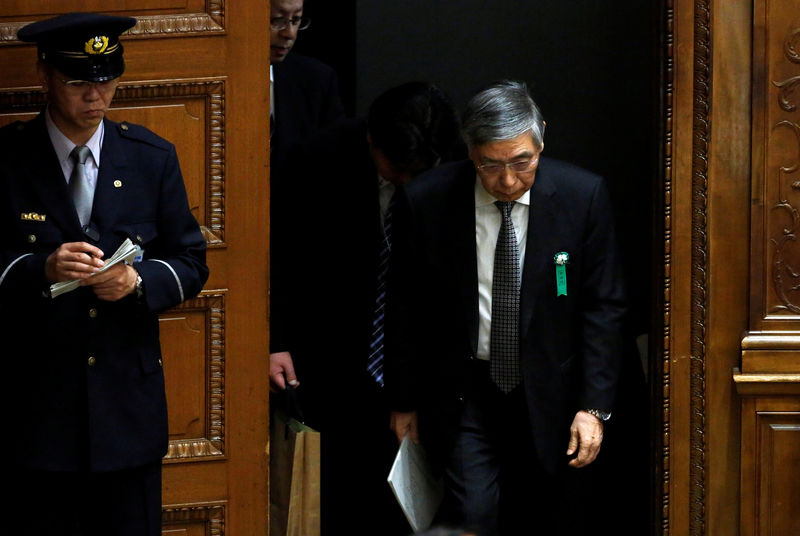 © Reuters. BOJ Governor Kuroda attends a lower house budget committee session at the parliament in Tokyo
© Reuters. BOJ Governor Kuroda attends a lower house budget committee session at the parliament in TokyoBy Leika Kihara
TOKYO (Reuters) – The reappointment of Bank of Japan Governor Haruhiko Kuroda for another five-year term means the central bank will continue to gradually edge away from crisis-mode stimulus, former BOJ board member Takahide Kiuchi said.
Premier Shinzo Abe’s decision to reappoint Kuroda, whose massive easing efforts failed to accelerate inflation to his 2 percent target since becoming governor in 2013, is a sign the government is no longer insisting that the BOJ meet its price goal quickly, he said.
Since abandoning a policy targeting the pace of money printing in 2016, the BOJ is already whittling down its sweeping stimulus program by slowing its bond purchases, Kiuchi said.
“A de-facto normalization of monetary policy is already taking place and will continue under a reappointed Kuroda,” said Kiuchi, who served at the BOJ’s nine-member board until July.
“The reappointment was a signal from the government that it wants continuity in monetary policy,” he told Reuters on Monday.
The government reappointed Kuroda for another five-year term on Friday, signaling its hope the BOJ will keep up efforts to reflate the economy.
During his tenure at the BOJ, Kiuchi has warned of the pitfalls of Kuroda’s monetary experiment and rightly predicted that the bank would be forced to slow its bond buying given the rising costs of its stimulus program. He retains deep insight into the workings of BOJ policy.
While the BOJ will continue to slow its bond buying, abandoning negative rates may take some time as it would require watering down its price target, said Kiuchi, currently executive economist at Nomura Research Institute.
“Policy normalization doesn’t mean the BOJ will abandon its ultra-easy policy. It’s just about gradually moderating the degree of monetary support,” he said.
After three years of heavy money printing failed to fire up inflation, the BOJ revamped its policy framework in 2016 to one targeting interest rates from the pace of money printing.
Since then, its bond buying has slowed to roughly half the pace it loosely commits to buy each year.
Fusion Media or anyone involved with Fusion Media will not accept any liability for loss or damage as a result of reliance on the information including data, quotes, charts and buy/sell signals contained within this website. Please be fully informed regarding the risks and costs associated with trading the financial markets, it is one of the riskiest investment forms possible.
Source: Investing.com




























